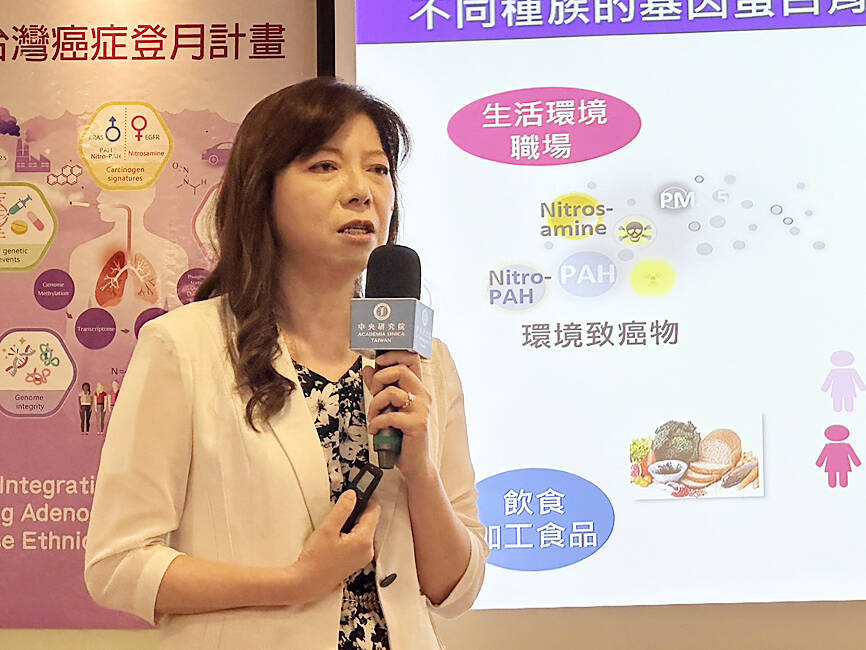Taiwanese and US scientists have identified sex-specific carcinogens that trigger lung cancer in distinct ethnic groups, a study published in Cancer Cell said.
Researchers from Academia Sinica and the US-based National Cancer Institute conducted the study, “Integrative analysis of lung adenocarcinoma across diverse ethnicities and exposures on cancer genomics,” using 406 tumors from North Americans, Eastern Europeans and Asians, coauthor Chen Yu-ju (陳玉如) told a news conference in Taipei yesterday.
The study, which was published on July 31, clarified the environmental mechanism causing genetic mutations that lead to lung cancer across ethnicities, said Chen, a researcher in Academia Sinica’s Institute of Chemistry.

Photo: Yang Yuan-ting, Taipei Times
Scientists linked polycyclic aromatic hydrocarbons, nitrosamines and other carcinogens from tobacco products to lung cancer by matching them to the mutation signatures of cancer cells, she said.
The substances are in exhaust fumes from combustion engines, in food additives, as well as in smoke from cigarettes, whether it be firsthand or secondhand, she said.
The impact of carcinogens varies according to sex, with men more likely to develop lung tumors from air pollution, and women more likely to develop it from food additives, she said.
Female hormones have unfavorable interactions with enzymes used to read and break down common food additives, thereby increasing the vulnerability of women to the substances, Chen said.
The research team grouped lung cancer tumors into C1, C2 and C3 genetic subtypes, with each correlating to distinct mortality rates, recurrence rates and prognoses, she said.
C2 tumors have a 50 percent five-year survival rate compared with the typical 90 percent, as they recur with alarming frequency even if identified and excised at an early stage, Chen said.
The expression of C2 tumors in men is correlated to carcinogens from the environment, while in women the correlation is to internally secreted prions, she said.
The discoveries help oncologists make accurate prognoses and determine appropriate treatment, she said.
Researchers identified four DNA breakpoints that can potentially be used in blood tests to identify people at high risk of developing lung cancer, she said, adding that tests would be available in two years at the earliest.
“These observations and the associated data resource advance the objective of precision management strategies for this devastating disease,” said the abstract of the paper, which is free to read on the Cancer Cell Web site.
The study is significant to Taiwan, because lung cancer is the leading type of cancer in the nation and the No. 1 cause of death, said Chen Jin-shing (陳晉興), head of the surgery department at National Taiwan University Hospital.
The research might explain the higher prevalence of lung cancer in Taiwanese women compared with men, and change the perception that the disease results mainly from airborne pollutants, placing more emphasis on the role of food additives, he said.

UKRAINE, NVIDIA: The US leader said the subject of Russia’s war had come up ‘very strongly,’ while Jenson Huang was hoping that the conversation was good Chinese President Xi Jinping (習近平) and US President Donald Trump had differing takes following their meeting in Busan, South Korea, yesterday. Xi said that the two sides should complete follow-up work as soon as possible to deliver tangible results that would provide “peace of mind” to China, the US and the rest of the world, while Trump hailed the “great success” of the talks. The two discussed trade, including a deal to reduce tariffs slapped on China for its role in the fentanyl trade, as well as cooperation in ending the war in Ukraine, among other issues, but they did not mention

Japanese Prime Minister Sanae Takaichi yesterday lavished US President Donald Trump with praise and vows of a “golden age” of ties on his visit to Tokyo, before inking a deal with Washington aimed at securing critical minerals. Takaichi — Japan’s first female prime minister — pulled out all the stops for Trump in her opening test on the international stage and even announced that she would nominate him for a Nobel Peace Prize, the White House said. Trump has become increasingly focused on the Nobel since his return to power in January and claims to have ended several conflicts around the world,

GLOBAL PROJECT: Underseas cables ‘are the nervous system of democratic connectivity,’ which is under stress, Member of the European Parliament Rihards Kols said The government yesterday launched an initiative to promote global cooperation on improved security of undersea cables, following reported disruptions of such cables near Taiwan and around the world. The Management Initiative on International Undersea Cables aims to “bring together stakeholders, align standards, promote best practices and turn shared concerns into beneficial cooperation,” Minister of Foreign Affairs Lin Chia-lung (林佳龍) said at a seminar in Taipei. The project would be known as “RISK,” an acronym for risk mitigation, information sharing, systemic reform and knowledge building, he said at the seminar, titled “Taiwan-Europe Subsea Cable Security Cooperation Forum.” Taiwan sits at a vital junction on

LONG-HELD POSITION: Washington has repeatedly and clearly reiterated its support for Taiwan and its long-term policy, the Ministry of Foreign Affairs said US Secretary of State Marco Rubio yesterday said that Taiwan should not be concerned about being used as a bargaining chip in the ongoing US-China trade talks. “I don’t think you’re going to see some trade deal where, if what people are worried about is, we’re going to get some trade deal or we’re going to get favorable treatment on trade in exchange for walking away from Taiwan,” Rubio told reporters aboard his airplane traveling between Israel and Qatar en route to Asia. “No one is contemplating that,” Reuters quoted Rubio as saying. A US Treasury spokesman yesterday told reporters